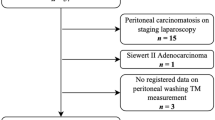Abstract
Background
Early diagnosis and management of peritoneal metastases from colorectal cancer patients are difficult clinical challenges. The aims of this study were to evaluate the clinical significance of tumor markers and cytology in peritoneal effusions (PE) and peritoneal irrigation fluid (PI) and to determine their value as prognostic indicators in this disease.
Methods
Two hundred thirty-four consecutive patients who underwent abdominal surgery for colorectal cancer from January 2006 to December 2007 were included, and tumor markers and cytology in PE and PI were analyzed prospectively.
Results
The incidence of free cancer cells retrieved from peritoneal samples was 7.9%. Cytology was positive in 40.0% by Papanicolaou and Giemsa staining, 73.3% by hematoxylin and eosin staining of cell blocks, and 66.7% by carcinoembryonic antigen (CEA) and calretinin immunohistochemistry. Multivariate analysis revealed that peritoneal CEA and cancer antigen (CA) 19–9 in PI were correlated with peritoneal metastasis and cytology. Level of peritoneal fluid CEA was statistically significantly correlated with recurrence and peritoneal metastatic recurrence in patients with negative peritoneal cytology. Cytology, peritoneal CEA, and peritoneal CA 19-9 showed correlations with cancer-free survival and overall survival.
Conclusions
These correlations demonstrate the importance of continuous follow-up of peritoneal metastasis if there is positive cytology or an increase in CEA and CA 19-9 in peritoneal fluid.




Similar content being viewed by others
References
Shen-Gunther J, Mannel RS. Ascites as a predictor of ovarian malignancy. Gynecol Oncol. 2002;87:77–83.
Yamamoto S, Akasu T, Fujita S, Moriya Y. Long-term prognostic value of conventional peritoneal cytology after curative resection for colorectal carcinoma. Jpn J Clin Oncol. 2003;33:33–7.
Hase K, Ueno H, Kuranaga N, Utsunomiya K, Kanabe S, Mochizuki H. Intraperitoneal exfoliated cancer cells in patients with colorectal cancer. Dis Colon Rectum. 1998;41:1134–40.
Hermanek P, Hutter RV, Sobin LH, Wittekind C. International Union Against Cancer: classification of isolated tumor cells and micrometastasis. Cancer. 1997;86:2668–73.
Fiegl M, Haun M, Massoner A, Krugmann J, et al. Combination of cytology, fluorescence in situ hybridization for aneuploidy, and reverse-transcriptase polymerase chain reaction for human mammaglobin/mammaglobin B expression improves diagnosis of malignant effusions. J Clin Oncol. 2004;22:474–83.
Lee IK, Yi JM, Lee YS, et al. The significance of peritoneal effusion in colorectal cancer. J Korean Soc Coloproctol. 2006;22:308–13.
Nagy JA, Masse EM, Herzberg KT, et al. Pathogenesis of ascites tumor growth: vascular permeability factor, vascular hyperpermeability, and ascites fluid accumulation. Cancer Res. 1995;55:360–8.
Vogel P, Rüschoff J, Kümmel, et al. Prognostic value of microscopic peritoneal dissemination: comparison between colon and gastric cancer. Dis Colon Rectum. 2000;43:92–100.
Park JD, Kim HC, Cho YK, Yu CS, Kim JC. The clinical significance of carcinoembrionic antigen and CA 72-4 assays of peritoneal fluid in colorectal carcinomas. J Korean Soc Coloproctol. 2002;18:303–36.
Kanellos I, Demetriades H, Zintzaras E, Mandrali A, Mantzoros I, Betsis D. Incidence and prognostic value of positive peritoneal cytology in colorectal cancer. Dis Colon Rectum. 2003;46:535–9.
Porcel JM, Vives M, Esquerda A, Salud A, Perez B, Rodriguez-Panadero F. Use of a panel of tumor markers (carcinoembryonic antigen, cancer antigen 125, carbohydrate antigen 15-3, and cytokeratin 19 fragments) in pleural fluid for the differential diagnosis of benign and malignant effusions. Chest. 2004;126:1757–63.
Alexandrakis MG, Moschandrea JA, Koulocheri SA, Kouroumalis E, Eliopoulos GD. Discimination between malignant and nonmalignant ascites using serum and ascitic fluid proteins in multivariate analysis model. Dig Dis Sci. 2000;45:500–8.
Yamamoto M, Baba H, Kakeji Y, et al. Prognostic significance of tumor markers in peritoneal lavage in advanced gastric cancer. Oncology. 2004;67:19–26.
Kanellos I, Zacharakis E, Kanellos D, Pramateftakis MG, Betsis D. Prognostic significance of CEA levels and positive cytology in peritoneal washings in patients with colorectal cancer. Colorect Dis. 2006;8:436–40.
Gozalan U, Yast AC, Yuksek YN, Reis E, Kama NA. Peritoneal cytology in colorectal cancer: incidence and prognostic value. Am J Surg. 2007;193:672–5.
Horattas MC, Evasovich MR, Topham N. Colorectal carcinoma and the relationship of peritoneal cytology. Am J Surg. 1997;174:334–8.
Simsir A, Fetsch P, Abati A. Carlretinin immunostaining in benign and malignant pleural effusions. Diagn Cytopathol. 2001;24:149–52.
Su XY, Li GD, Liu HB, Jiang LL. Significance of combining detection of E-cadherin, carcinoembryonic antigen, and calretinin in cytological differential diagnosis of serous effusion. Ai Zheng. 2004;23:1185–9.
Acknowledgments
I.K.L. was supported by CJ-Aventis New Research Grant from Korean Society of Coloproctology and a grant from the National R&D Program for Cancer Control, Ministry of Health and Welfare, Republic of Korea (A080760).
Author information
Authors and Affiliations
Corresponding authors
Rights and permissions
About this article
Cite this article
Lee, I.K., Kim, D.H., Gorden, D.L. et al. Prognostic Value of CEA and CA 19-9 Tumor Markers Combined with Cytology from Peritoneal Fluid in Colorectal Cancer. Ann Surg Oncol 16, 861–870 (2009). https://doi.org/10.1245/s10434-008-0294-3
Received:
Revised:
Accepted:
Published:
Issue Date:
DOI: https://doi.org/10.1245/s10434-008-0294-3




